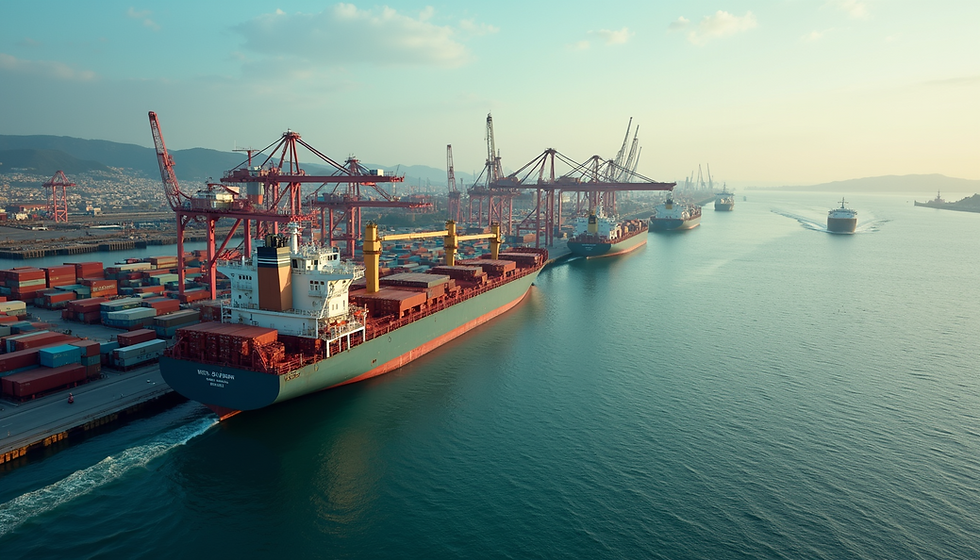How to Optimize Global IT Hardware Movement with a Reliable Logistics Partner
- Mads Christiansen

- Jul 4, 2025
- 4 min read
As technology continues to advance, the demand for IT hardware is skyrocketing. Businesses are expanding their global reach, which brings new challenges in shipping these crucial goods. For logistics managers and directors, finding a trustworthy logistics partner is critical to ensure smooth movement of IT hardware across borders. This article highlights the essential role of logistics partners in compliance with import/export regulations, risk management, and cost optimization, emphasizing the benefits of collaborating with an Importer of Record (IOR) like MCGlobe.
Understanding the Role of Logistics Partners
Logistics partners play a key role in moving IT hardware efficiently. They handle the complexities of international transport, ensuring timely delivery while complying with necessary regulations. Choosing the right logistics partner can dramatically improve operational efficiency.
A dependable logistics partner possesses deep knowledge of customs clearance for IT hardware. This is crucial as mishandling customs can lead to delays. For example, a company that ships hardware internationally may face a 20% increase in shipping costs due to unforeseen customs issues. A seasoned logistics partner can help avoid such costly disruptions.
Firms involved in global IT hardware logistics encounter unique challenges, such as different regulations and compliance requirements across countries. A reliable logistics partner can effectively navigate these hurdles, ensuring a smoother shipping process.
Compliance with Local Import/Export Regulations
A primary duty of logistics partners is to ensure adherence to local import and export regulations. Each country has specific rules regarding the import of IT hardware. Non-compliance can lead to penalties, shipment delays, or even confiscation of goods.
For instance, businesses importing IT hardware into Brazil must navigate stringent regulations. Failure to comply can result in fines up to 60% of the shipment's value. A logistics partner with expertise in local regulations can manage all required documentation and processes, significantly reducing the risk of complications.
Compliance also involves understanding tariffs and taxes. Partnering with a logistics company focused on compliance can lead to cost savings and smoother delivery processes.

Risk Management: Navigating Customs Delays and Documentation Errors
International logistics is fraught with risks like customs delays, documentation errors, and regulatory fines. A reliable logistics partner enhances risk management strategies significantly.
Customs delays are common. They may arise from improper documentation or unexpected regulatory changes. A proficient logistics partner will prepare correct documentation in advance and monitor regulatory changes that could affect transport schedules.
For example, documentation errors can result in an average delay of 7 to 10 days in customs clearance. By ensuring proper documentation, a logistics partner can help maintain timely shipments.
Since a logistics partner acts as a liaison between various entities—including customs authorities, shipping lines, and import/export agencies—having their expertise can ensure smoother communication. This relationship can expedite problem resolution and maintain compliance.

Cost Optimization: Balancing Expenses with Efficiency
Cost is a crucial factor in international shipping. Businesses constantly seek ways to optimize expenses while ensuring safe delivery. A knowledgeable logistics partner can help implement effective cost optimization strategies.
One way logistics partners facilitate cost savings is through shipment consolidation. This means grouping smaller shipments together, leading to lower freight costs. For example, consolidated shipping can reduce costs by up to 30%. Companies also simplify customs processes with fewer shipments.
Additionally, logistics partners can identify the most economical shipping routes and methods. They can recommend carriers that offer the best balance of speed and affordability, helping businesses save on expenses.
The Strategic Value of Working with an Importer of Record (IOR)
In some regions, working as an Importer of Record (IOR) is essential due to local laws requiring a legal presence or tax registration. An IOR like MCGlobe can serve as a trusted representative, guiding businesses through regional complexities.
For example, when companies require import licenses or tax registration, a reliable IOR can simplify the process dramatically. IOR services cover all aspects of the import process, ensuring compliance with all regulations.
Engaging with an IOR means logistics managers can focus on their core responsibilities instead of getting entangled in regulatory compliance. IORs also provide insights into regional market conditions, which can be beneficial for business decisions.
Reducing Friction and Providing End-to-End Visibility
A trustworthy logistics partner not only ensures compliance but also minimizes friction in the supply chain. Establishing clear communication channels and managing documentation reduces the time for IT hardware to reach its destination.
End-to-end visibility is essential. It allows stakeholders to track shipments in real-time, offering insights into delivery times and potential hurdles. This transparency leads to better planning.
Leveraging advanced tracking technologies, logistics partners can provide dashboards that show shipment progress at any stage. This reassures businesses that their goods are being handled properly.
Long-Term Benefits of Aligning with a Global Logistics Expert
In a competitive environment, partnering with a global logistics expert who focuses on IT hardware transport provides long-term advantages that go beyond compliance and risk management. Organizations that build strong relationships with logistics partners benefit from improved operational performance and sustained growth.
These partnerships enhance collaboration, allowing logistics providers to grasp specific business needs. As a result, logistics optimization becomes an ongoing process focused on improving efficiencies and cutting costs.
Furthermore, long-term relationships with stable logistics providers increase a company’s agility in responding to changing market conditions. A trusted partner can offer strategic advice to navigate new technologies and regulations.
In summary, collaborating with a reputable logistics partner empowers businesses to focus on their primary operations while managing the complexities of global IT hardware logistics effectively.





.png)